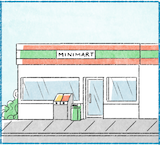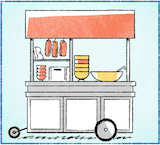



นี้คืออี่หยัง อันนี้คือล้านขายของ หลือว่าล้านสะดวกซื้อเนาะ
ในล้านนี้กะสิมีหลายสิ่งหลายอย่าง หลือว่าขายหลายสิ่งหลายอย่างอยู่ในล้านอันนี้
ญามเฮาต้องกานอี่หยัง หลือว่าอยากซื้ออี่หยังที่มันเป็นสิ่งน้อยๆ หลือว่าซิ้นน้อยๆ แน่ๆ เนาะ เฮากะสามาดที่ไปซื้ออยู่ในล้านอันนี้ได้
แล้วล้านขายของอันนี้เปิดตะหลอดเวลาบ่ กะแล้วแต่ล้าน บางล้านกะเปิดยี้สิบสี่ซั่วโมง หลือว่าเปิดเบิดมื้อเบิดค่ำ แต่ว่าบางล้านกะเปิดซั่วคาว หลือว่าเปิดได้ญามมื้อเว็นส่ำนั้น
6
นี้คืออี่หยัง อันนี้คือลด เป็นลดขายแนวกิน หลือว่าลดขายกับเข้าเนาะ
แล้วเป็นหญังเขาคือมาขายเทิงลด เป็นหญังเขาคือขายของอยู่เทิงลด กะจักคือกัน เขาอาดสิบ่มีเป็นล้านขาย เขากะเลยมาขายอยู่เทิงลด เพื่อที่ว่าเขาสิได้ขายแนวกินนั้นเอง
แล้วเขาขายอี่หยังแน่ กะขายเป็นแนวกิน ขายกับเข้าเนาะ อาดสิเป็นขายอาหานตามสั่งกะได้ ที่คนอยากกินอี่หยังกะไปสั่งเขา แล้วเขากะสิได้กินแนวอันนั้นเนาะ
7
นี้คืออี่หยัง อันนี้กะเป็นล้านขายของ แต่ว่าเป็นล้านขายเสี้ยผ้าเนาะ กะขายหลายสิ่งหลายอย่างเกี่ยวกับเสี้ยผ้า หลือว่าแนวใส่ หลือว่าแนวนุ่งห่มเนาะ
กะอย่างเซ้นมีเสี้ยผ้า มีเทิงส้งแน่ มีเสี้ยแน่ มีเกิบแน่ มีหลายสิ่งหลายอย่างเกี่ยวกับแนวใส่ของคนเนาะ
8
นี้คืออี่หยัง อันนี้กะเป็นล้านคือกัน ล้านตัดผม
อันนี้เป็นล้านตัดผมเนาะ เป็นล้านบอลิกาน เพื่อที่ว่าสิให้คนมาตัดผม
แล้วในล้านนั้นแนมเข้าไปหนะสิมีอี่หยังแน่ กะมีคน มีคนสามคน คนหนึ่งกะนั่งอยู่เทิงโต่ะ เพื่อที่ว่าสิให้สั่งตัดผม มาตัดผมให้เจ้าของ คนยืนอยู่หั้นกะเป็นซ่างตัดผม ยืนอยู่หั้นกะเพื่อว่าสิตัดผมให้ลูกค้าเนาะ แล้วกะอีกคนหนึ่งนั่งอยู่เคาเต้อ อาดสิเป็นพะนักงานเก็บเงิน หลือว่าพะนักงานคิดเงินนั้นเอง
Link to overview page
Link to dictionary
| Isaan | Pronunciation | Tones | Thai | English/Notes |
|---|---|---|---|---|
| นี้ | ni: | HF | นี้ | 1. this 2. here |
| คือ | khʉ: | HR | คือ | 1. to be, to resemble, like, as 2. why {บักหล้าคือบ่เก็บโต่ะแน่ = [addressing a young boy] Why haven't you cleared the table?} |
| อี่หยัง | i:-yaŋ | H-M | อะไร | 1. what {นี้คืออี่หยัง = What is this?} {มื้อนี้เจ้าเฮ็ดอี่หยัง = What are you doing today?} {กินเข้างายกับอี่หยัง = What did you have for breakfast?} 2. something, anything, (in negations) nothing {บ่ต้องเฮ็ดอี่หยังอีกเลยนอกจากใส่ปุย = [we] don't need to do anything besides adding fertilizer} |
| อัน | an | M | อัน | 1. thing, object 2. general clf. for objects |
| ล้านขายของ | la:n-kha:i-khɔ:ŋ | HF-M-M | ร้านขายของ | shop, store |
| หลือ | lʉ: | M | หรือ | or |
| ว่า | wa: | H | ว่า | 1. that, as {คำว่า X = the word X} 2. to say |
| ล้าน | la:n | HF | ร้าน | shop {ล้านขายผนละไม้ = shop selling fruits} {ล้านขายเสี้ยผ้า = clothes shop} |
| สะดวก | sa-du:ak | M-LF | สะดวก | convenient |
| ซื้อ | sʉ: | HF | ซื้อ | to buy |
| เนาะ | nɔ | H | เนาะ | final particle: makes the statement softer, looking for agreement |
| ใน | nai | HR | ใน | in, within |
| กะ | ga | M | ก็ | 1. then, consequently 2. also |
| สิ | si | M | จะ | future tense auxiliary {เขากำลังสิตื่น = he's about to wake up} {สิไปตะหลาด = [I'm] going to the market} |
| มี | mi: | HR | มี | 1. to have 2. there is |
| หลายสิ่งหลายอย่าง | la:i-siŋ-la:i-ya:ŋ | M-H-M-H | หลากหลาย, มากมาย, หลายอย่าง | varied, various, several (kinds etc.) |
| ขาย | kha:i | M | ขาย | to sell |
| อยู่ | yu: | H | อยู่ | 1. to be (located) at 2. yet, still 3. auxiliary indicating continuous or progressive action {ทอดปาอยู่ในกะทะ = (in the process of) frying a fish in the pan} {แม่กำลังเมี้ยนเฮียนอยู่ = mother is cleaning/tidying up the house} |
| ญาม | ɲa:m | HR | ยาม | 1. period of time {ญามมื้อเซ้า = morning} {ญามเที่ยง = noon} 2. when, while {ญามทอด ต้องใซ้น้ำมันพ้อม = one needs to use oil when frying} {ญามสิออกไปข้างนอกกะต้องใส่เกิบ = when one goes out, ones has to wear shoes} |
| เฮา | hao | HR | เรา | 1. personal pronoun: we 2. personal pronoun: I |
| ต้องกาน | tɔŋ-ga:n | HF-M | ต้องการ | to need, require, desire, wish, demand |
| อยาก | ya:k | LF | อยาก | to want, to wish |
| ที่ | thi: | H | ที่ | 1. that, which {คนที่ยืนอยู่ฝั่งขวา = the person which is standing on the right = the person standing on the right} {เว้าคำที่บ่สุพาบ = to speak words which are impolite = to speak impolitely} 2. for ordinal numbers {ที่สาม = third} |
| มัน | man | HR | มัน | it (also used to refer to people) |
| เป็น | pen | M | เป็น | 1. to be, to exist 2. to be able to 3. to suffer, sth. happens to 4. เป็นหญัง[...]คือ in initial position: why? {เป็นหญังเขากะคือแปงฟัน = Why is he brushing his teeth?} {เป็นหญังเคี่ยงบินมันคือสิตก = Why is the airplane falling down?} |
| สิ่ง | siŋ | H | สิ่ง | thing, object |
| น้อย | nɔ:i | HF | น้อย | 1. few, little 2. small |
| ซิ้น | sin | HF | ชิ้น | 1. piece, slice 2. skin {หนีบซิ้น = to pinch the skin} |
| แน่ | nɛ: | H | แน่, บ้าง | 1. some, somewhat 2. final particle, used to ask for examples (similar to Thai บ้าง at the end of a question) {หม้อใซ้เฮ็ดอี่หยังได้แน่ = What (different things) can a pot be used for?} {น้ำอัดลมซื้อได้อยู่ใสแน่ = Where/in which places can one buy soft drinks?} 3. final particle, when giving examples {มีเทิงส้งแน่ มีเสี้ยแน่ มีเกิบแน่ = there are trousers, shirts, shoes etc.} 4. final particle, used to give a command {ไปปิดหน้าต่างให้แน่ = Close the window!} 5. final particle, acting as an intensifier, especially in the pattern ... คัก ... แน่ {สูงคักสูงแน่ = very high} {ญ้องเฮาคัก ญ้องเฮาแน่ = [he's] praising me a lot} |
| สามาด | sa:-ma:t | M-HF | สามารถ | can, to be able |
| ไป | pai | M | ไป | 1. to go 2. auxiliary indicating action extending into the future |
| ได้ | dai | HF | ได้ | 1. can 2. to get, to obtain 3. before verb: indicating past tense 4. บ่ได้ + verb: not |
| แล้ว | lɛ:o | HF | แล้ว | 1. finished 2. already 3. and then, and next (especially แล้วกะ) 4. auxiliary for past tense |
| เปิด | pə:t | M | เปิด | 1. to open {เปิดหน้าต่าง = to open the window} {เปิดปะตู = to open the door} 2. to start, to switch on {เปิดไฟ = to switch on the light} {เปิดแอ = to switch on the A/C} |
| ตะหลอดเวลา | ta-lɔ:t-we:-la: | M-LF-HR-HR | ตลอดเวลา | all the time, always |
| บ่ | bɔ: | H | ไม่ | 1. no, not 2. question particle, transforming a statement into a question Notes: spelling exception in line with common usage on social media |
| แล้วแต่ | lɛ:o-tɛ: | HF-H | แล้วแต่ | up to, depending on |
| บาง | ba:ŋ | M | บาง | 1. some {สัดบางโตบ่มีขา = some animals don't have legs} {บางคนสิมักกินกวยเตียวแทนเข้า = some people like to eat noodle soup instead of rice (dishes)} {บางสิ่งบางอย่าง = something, anything} 2. thin |
| ยี้สิบ | yi:-sip | HF-M | ยี่สิบ | twenty |
| สี่ | si: | H | สี่ | four |
| ซั่วโมง | su:a-mo:ŋ | H-HR | ชั่วโมง | hour |
| เบิดมื้อเบิดค่ำ | bət-mʉ:-bət-kham | M-HF-M-H | ทั้งวันทั้งคืน | [all] day and night, around the clock |
| แต่ว่า | tɛ:-wa: | H-H | แต่ว่า | 1. but 2. only {ฮู้แต่ว่าเขายืนอยู่พุเดียว = I only know that he's standing there by himself} |
| ซั่วคาว | su:a-kha:o | H-HR | ชั่วคราว | 1. temporary 2. provisional, tentative |
| มื้อเว็น | mʉ:-wen | HF-HR | กลางวัน | day, daytime |
| ส่ำนั้น | sam-nan | H-HF | แค่นั้น | 1. just that, only that 2. that much |
| ลด | lot | H | รถ | 1. car, motorized vehicle 2. vehicle, cart {ลดขายแนวกิน = food cart} |
| แนวกิน | nɛ:o-gin | HR-M | อาหาร | food {เฮ็ดแนวกิน = to prepare food} {ตำบักหุ่งเนี้ยกะสิเป็นแนวกิน = papaya salad is (a kind of) food} |
| กับเข้า | gap-khao | M-LF | กับข้าว | 1. course eaten with rice, things to eat with rice 2. dish |
| หญัง | ɲaŋ | M | อะไร, เป็นหญัง = ทำไม | 1. what {เขากำลังเฮ็ดหญัง = What is he doing?} {ธูปเอาไว้เฮ็ดหญัง = What are incense sticks for?} 2. something, anything, (nothing) 3. เป็นหญัง[...]คือ in initial position: why {เป็นหญังเขาคือใส่บักพิกลงไปในกวยเตียว = Why is he putting chili in [his] noodle soup?} {เป็นหญังหน้าต่างมันคือเปิด = Why is the window open?} {เป็นหญังมันคือมีควนไฟ = Why is there smoke?} |
| เขา | khao | M | เขา | personal pronoun: he, she |
| มา | ma: | HR | มา | 1. to come 2. auxiliary expressing action towards the present or focal time {กะคุเฮ็ดมาจากอี่หยัง = What is the bucket made of?} {แล้วเขากะเก็บเงินจากพุนั้นมา = and then she takes the money of that person} |
| เทิง | thə:ŋ | HR | บน | 1. on, on top of, at, in {เทิงโต่ะ = at/on the table} {กบมันนั่งอยู่เทิงใบบัว = the frog is sitting on the lotus leaf} {เทิงท้องฟ้า = in the sky} {มันแล่นอยู่เทิงลาง = [the train] runs on rails} {มีคนนั่งอยู่เทิงลดสามล้อสามคน = there are three people sitting in the tuk tuk} 2. up, upward Notes: pronunciation: also realized as ทัง |
| ของ | khɔ:ŋ | M | ของ | thing, object |
| จัก | jak | M | จัก | 1. answer to a question: [I] don't know, don't know exactly, [I'm] not sure {พุซายคนนี้เขาเถ้าไป่ จัก จักเถ้าหลือบ่เถ้า เบิ่งบ่ค่อยออก = Is this man here already old? I don't know. I can't see clearly whether he's old or not.} {เขาเว้ากันอยู่ใส จักคือกัน = Where are they talking? I don't know either.} 2. exact(ly), what exactly {จักต้มอี่หยังกะบ่ฮู้ = I don't know what (exactly) he is cooking} {บ่ลู้คือกันจักปาอี่หยัง = I don't know either what kind of fish this is} 3. how much/many? {ต้นไม้มีจักต้น = How many trees are there?} {ตอนนี้จักโมงแล้ว = What time is it now?} {มือของเฮานี้สิมีจักนิ้ว = How many fingers do our hands have?} 4. a bit, a little bit {จักหน่อย/จักหน่อยหนึ่ง = a bit, a little bit} |
| คือกัน | khʉ:-gan | HR-M | เหมือนกัน | 1. also, likewise, similarly {ยินดีที่ได้ฮู้จักคือกันคับ = Nice to meet you too!} 2. in negative sentences: either {บ่ลู้คือกัน = I don't know either} {จักคือกัน = I don't know (either)} |
| อาด | a:t | LF | อาจ | 1. might, may, will 2. likely |
| เลย | lə:i | HR | เลย | 1. futher on, beyond, past {เข็มน้อยเลยเลขสิบสองไป = the minute hand has passed number twelve} 2. too much 3. at all 4. definitively 5. completely, utterly |
| เพื่อที่ | phʉ:a-thi: | H-H | เพื่อที่ | in order to, so that Notes: the vowel เอือ is likely to be a Thai loan |
| นั้นเอง | nan-e:ŋ | HF-M | นั่นเอง | 1. there 2. sure enough 3. emphasizes that the preceding is the topic or has been mentioned before Notes: Thai loan |
| อาหาน | a:-ha:n | M-M | อาหาร | food {ญุงมันกินเลียดเป็นอาหาน = the mosquito feeds on blood} |
| ตามสั่ง | ta:m-saŋ | M-H | ตามสั่ง | 1. made-to-order 2. type of food which is prepared to the specifications of the customer, usually various types of fried rice |
| คน | khon | HR | คน | person, people |
| กิน | gin | M | กิน | to eat, to consume, to use |
| สั่ง | saŋ | H | สั่ง | to order |
| แนว | nɛ:o | HR | 1. kind, sort, type 2. method, mode of action - and the corresponding tool or object, thing {แนวนุ่งห่ม = clothes, clothing} {แนวคม = sharp object [e.g., a pair of scissors]} {แนวถือ = handle} 3. clf. for words starting with แนว {กินแนวอันนั้น = กินแนวกินอันนั้น = to eat this food [which was talked about earlier]} |
|
| นั้น | nan | HF | นั้น | that, there |
| เสี้ยผ้า | si:a-pha: | LF-LF | เสื้อผ้า | clothes, clothing |
| เกี่ยวกับ | gi:ao-gap | H-M | เกี่ยวกับ | about, regarding, pertaining to |
| แนวใส่ | nɛ:o-sai | HR-H | เสื้อผ้า | clothing, clothes |
| นุ่งห่ม | nuŋ-hom | H-H | นุ่งห่ม | clothes: to wear, to put on {แนวนุ่งห่ม = clothes, clothing} |
| อย่างเซ้น | ya:ŋ-sen | H-HF | อย่างเช่น | for example, such as, like Notes: pronunciation: also realized as อย่างเช้น |
| เทิง | thə:ŋ | HR | ทั้ง | 1. up to, all, all of, the whole of, altogether {เขาใส่กางเกงขาสั้นเทิงสองคน = both are wearing short trousers} {เขาเป็นพ่อของลูกเทิงสามคนนี้ = he's the father of these three [children] here} 2. เทิง ... เทิง ...: both ... and ..., ... as well as ... {เทิงมีใบพ้อม เทิงมีเหลียนพ้อม = there are notes as well as coins} Notes: pronunciation: also realized as ทัง |
| ส้ง | soŋ | LF | กางเกง | trousers Notes: synonym: กางเกง |
| เสี้ย | si:a | LF | เสื้อ | shirt |
| เกิบ | gə:p | LF | รองเท้า | 1. shoe 2. general term for footwear |
| ของ | khɔ:ŋ | M | ของ | of, belonging to |
| ล้านตัดผม | la:n-tat-phom | HF-M-M | ร้านตัดผม | hairdresser's, barber shop |
| บอลิกาน | bɔ:-li-ga:n | M-H-M | บริการ | service |
| ให้ | hai | LF | ให้ | 1. to give {หมอกำลังเอายาให้คนป่วยกิน = the doctor is giving the patient medicine} 2. for 3. to allow, to be allowed |
| ตัด | tat | M | ตัด | to cut {ตัดผม = to cut hair} |
| ผม | phom | M | ผม | hair |
| แนม | nɛ:m | HR | มอง | to look, to glance, to stare {เขากำลังยืนแนมก้อนหินอยู่ = he's standing and looking at the stone/rock} {ข้างหนึ่งแนมเห็น อีกข้างหนึ่งแนมบ่เห็น = [we] see one side, [we] can't/don't see the other side} |
| เข้า | khao | LF | เข้า | to enter, to go inside, to come/go in/on {เข้าห้องน้ำ = to go to the bathroom} {เข้านอน = to go to bed} {ขี่เลียเข้าไปเกาะ = to take a boat to go on an island} |
| หนะ | na | M | final particle | |
| สาม | sa:m | M | สาม | three |
| หนึ่ง | nʉŋ | H | หนึ่ง | 1. one 2. after adjective: intensifier {บักคักหนึ่ง = very much} {อันบักใหญ่หนึ่ง = very large}, or attenuates the meaning {กะดาดมันแผ่นน้อยๆ หนึ่ง = the piece of paper is [relatively] small} |
| นั่ง | naŋ | H | นั่ง | to sit |
| โต่ะ | to | H | โต๊ะ, เก้าอี้ | 1. table 2. chair |
| เจ้าของ | jao-khɔ:ŋ | HF-M | เจ้าของ | 1. personal pronoun: oneself 2. owner |
| ยืน | yʉ:n | M | ยืน | to stand |
| หั้น | han | LF | ที่นั่น | there, over there |
| ซ่างตัดผม | sa:ŋ-tat-phom | H-M-M | ช่างตัดผม | hairdresser |
| เพื่อ | phʉ:a | H | เพื่อ | for Notes: the vowel เอือ is likely to be a Thai loan; pronunciation: also realized as เพี่ย |
| ลูกค้า | lu:k-kha: | HF-HF | ลูกค้า | customer |
| อีก | i:k | LF | อีก | 1. more, again 2. other, another |
| เคาเต้อ | khao-tə: | HR-HF | เคาน์เตอร์ | counter, reception, desk |
| พะนักงาน | pha-nak-ŋa:n | H-H-HR | พนักงาน | employee, worker |
| เก็บ | gep | M | เก็บ | 1. to collect, to gather, to accumulate, to pick/harvest {เก็บเงิน = to save money} {in a restaurant: เก็บเงิน = to get the bill} {เก็บน้ำ = to collect and store water} {เก็บผัก = to harvest vegetables} 2. to keep 3. to take in, to put away, to tidy up |
| เงิน | ŋən | HR | เงิน | money |
| คิด | khit | H | คิด | 1. to think 2. to calculate {คิดเงิน = to calculate the price} |